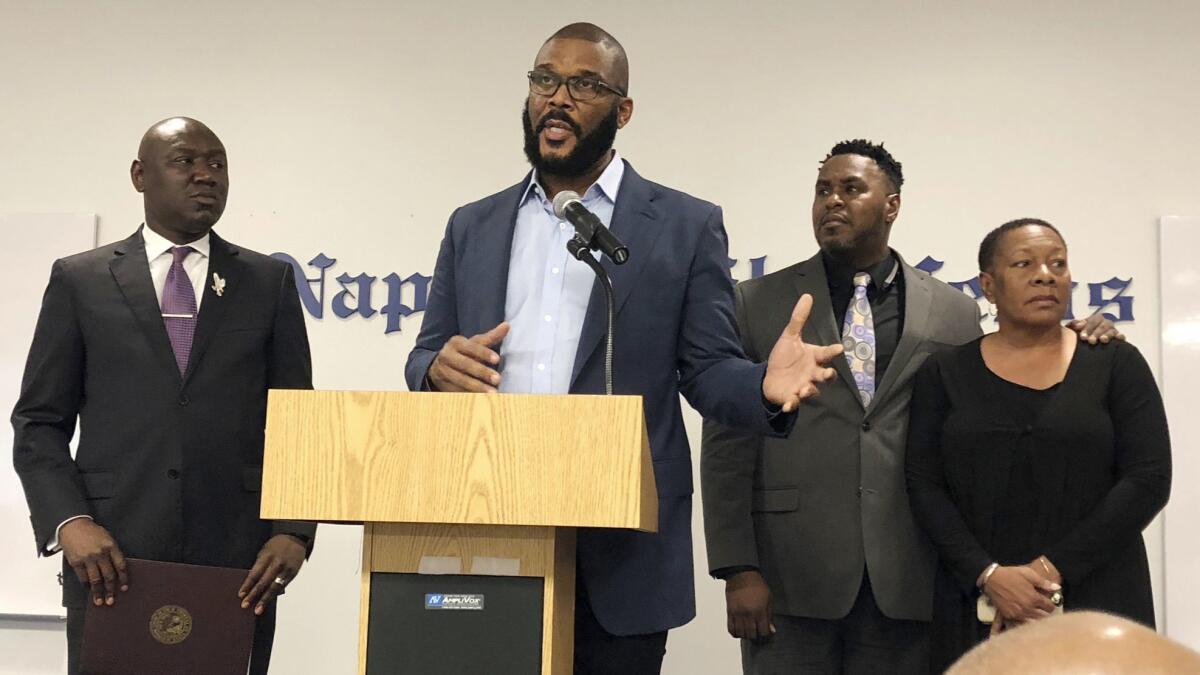Lawsuit targets former Florida sheriff’s deputy linked to two disappearances 15 years ago

Nearly 15 years after two men — one Latino, another African American — vanished in a southwest Florida town after crossing paths with a local sheriff’s deputy, a civil rights attorney teamed up with entertainment mogul Tyler Perry on Tuesday to announce the filing of a wrongful-death lawsuit on behalf of the mother of one of the victims.
Felipe Santos and Terrance Williams disappeared in Naples, Fla., within three months of each other. Both had been picked up by then-Collier County Sheriff’s Deputy Steven Calkins, who was fired months later after giving conflicting statements and refusing to cooperate with an internal police investigation.
“These two men disappeared off the face of the Earth, and the last person to see them alive was this sheriff’s deputy,” civil rights attorney Benjamin Crump said Tuesday at a news conference as he stood next to Terrance Williams’ mother, Marcia Williams, the plaintiff in the lawsuit.
“He will be made to answer,” Crump said, “and my God, it’s long overdue that he answer these questions.”
Calkins, who has since relocated to Cedar Rapids, Iowa, did not respond to requests for comment.
The bodies of Santos and Williams have never been found.
Crump said that has made it a challenge to bring criminal charges against Calkins. A civil suit could lead to new evidence that could eventually pave the way for a criminal trial, he said.
“What we really want is the person that took Terrance away from her, who took Felipe away from his family, to be held accountable,” Crump said. “That is the goal. We know, without a shadow of a doubt, we will get a judgment in a court of law in the civil matter.”
The lawsuit, filed in Florida’s 20th Judicial Circuit, claims that Calkins “breached” his duty to use reasonable care in his interactions with Williams and “intentionally murdered or otherwise caused” his death. It seeks in excess of $15,000, plus costs, for wrongful death.
The first disappearance occurred in October 2003. Santos, a 23-year-old Mexican who was living in the U.S. illegally, was driving to work with two brothers in North Naples when he was involved in a minor crash.
Calkins arrested Santos on suspicion of driving without a license and put him in the back of his patrol car, but never booked him into the Collier County Jail. He later said he dropped Santos off at a Circle K gas station.
Three months later, Williams, a 27-year-old black man, went missing. According to the lawsuit, Williams was driving a white 1983 Cadillac on Jan. 12, 2004, when Calkins initiated a traffic stop at a local cemetery without calling or radioing to dispatch.
After Williams was unable to produce a driver’s license, registration or proof of insurance, the lawsuit said, Calkins patted him down and put him in the back of his patrol car.
The lawsuit claims that Calkins returned to the cemetery later that day with the keys to the Cadillac, drove it out of the parking lot and placed the keys on the ground nearby in an attempt to “stage a scene” before contacting police dispatch to report that he had located an abandoned “Homie” Cadillac and arranging for it to be towed.
When Williams did not return home, his family filed a missing-person’s report.
In an audio-recorded conversation four days after Williams’ disappearance, Calkins told a dispatcher he had not been to the cemetery and denied interacting with Williams or having his car towed.
Perry, the Atlanta-based actor and filmmaker, became interested in the disappearances after watching a television show about them. Five years ago, he offered $100,000 for any new information.
On Tuesday, he said he was shocked by the lack of coverage the cases had received from local and national media and suggested it was because the victims were minorities. Perry, who is black, then upped the reward to $200,000.
“When somebody goes missing and they are a blue-eyed, blonde woman, it’s all over the news,” Perry said before gesturing to Marcia Williams. “This woman has been struggling privately for many, many years just to get attention.”
Williams said she was pursuing the case in large part for her son’s four children.
“I’m not going to let it go until I get the answers that they deserve to have,” she said. “We are going to see that justice is done, that this deputy pays.”
jenny.jarvie@latimes.com
@jennyjarvie
More to Read
Start your day right
Sign up for Essential California for news, features and recommendations from the L.A. Times and beyond in your inbox six days a week.
You may occasionally receive promotional content from the Los Angeles Times.







